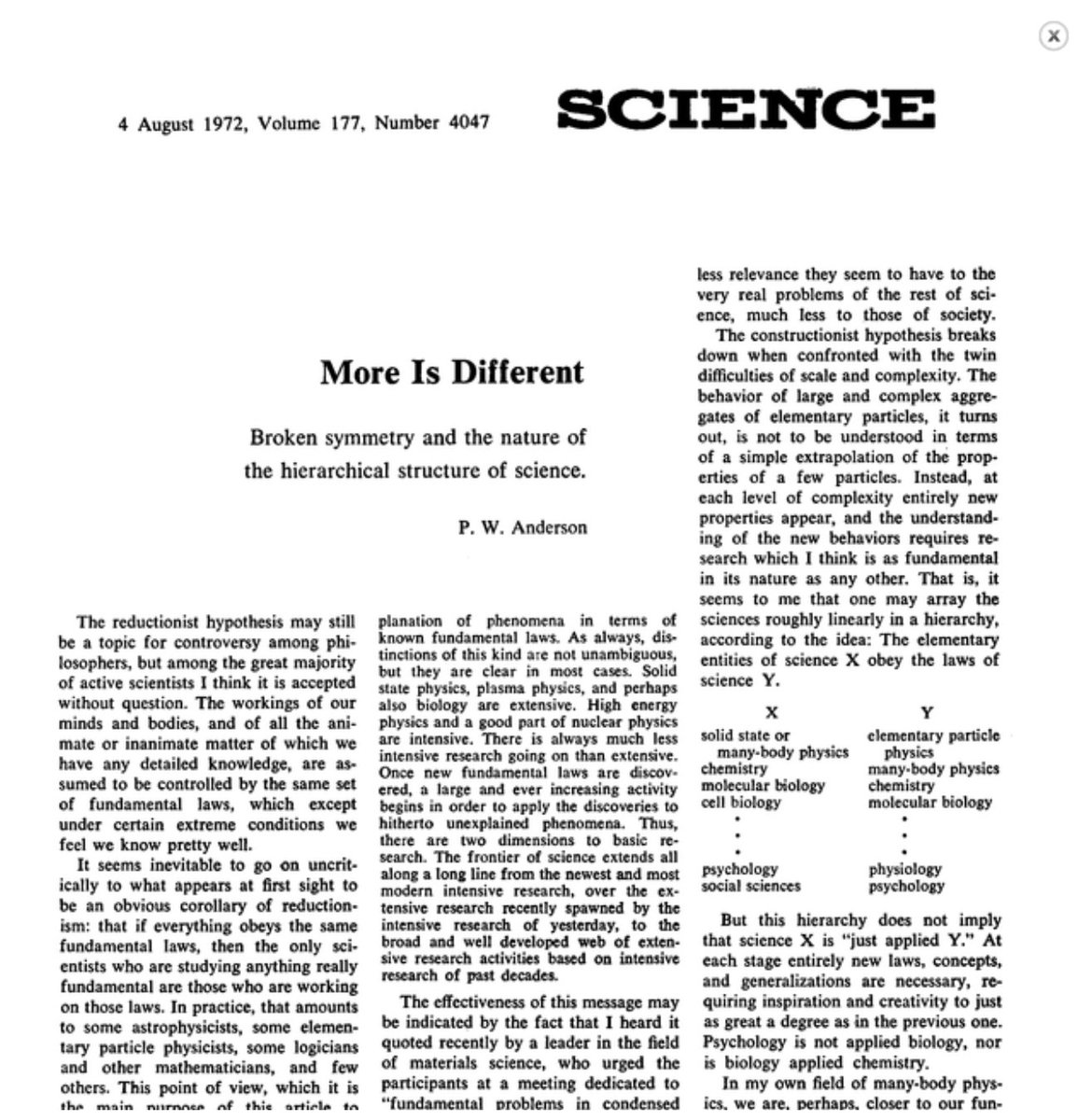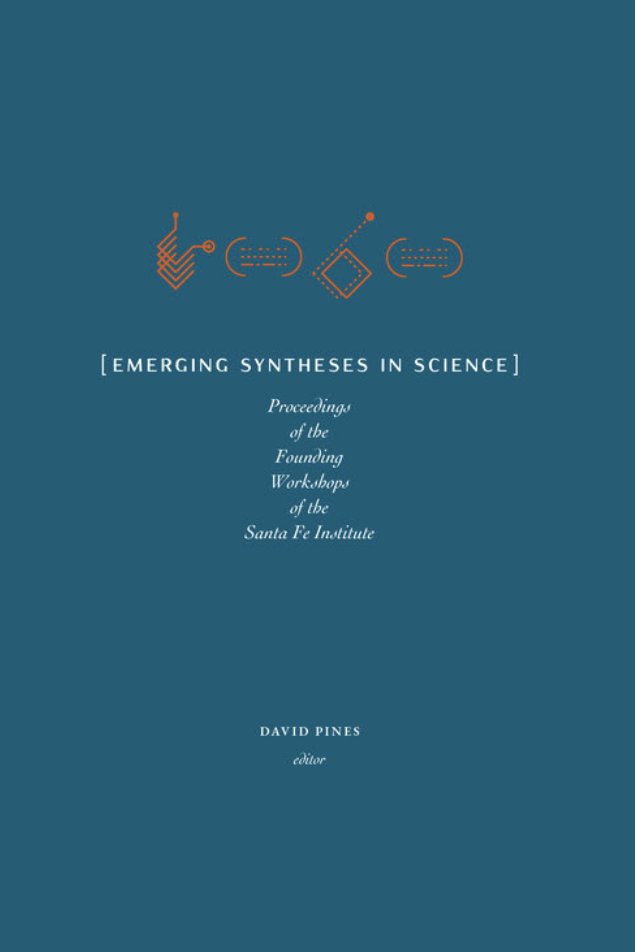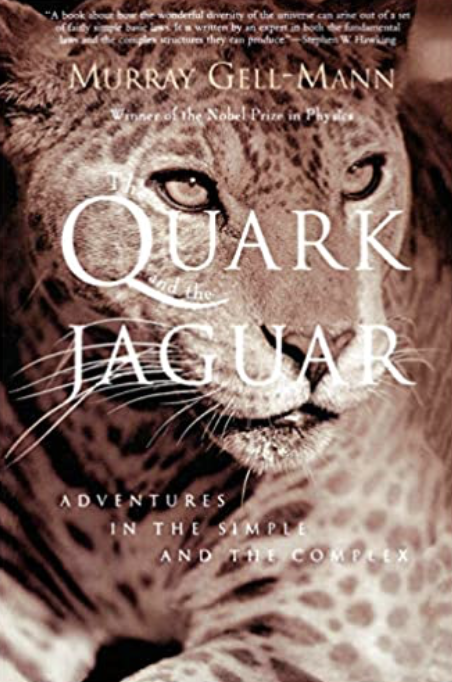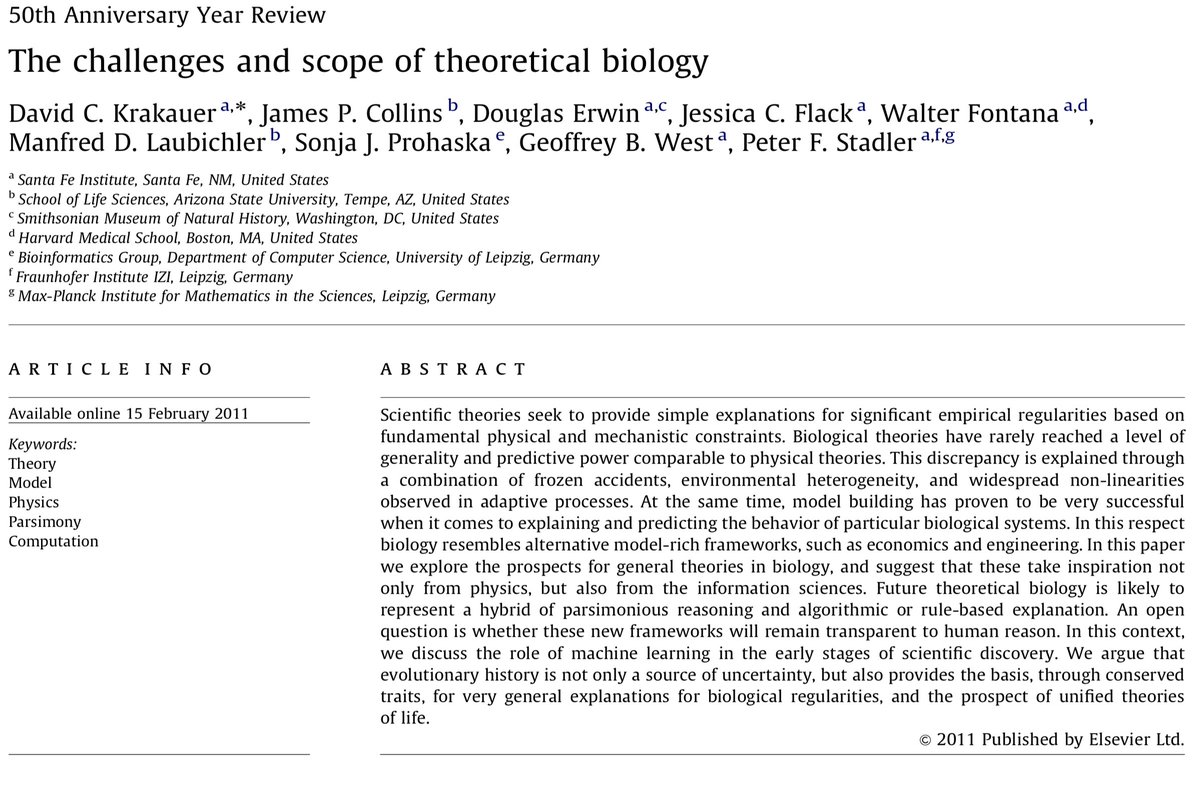What is complexity science? A complex system is collective (many body--meaning many interacting parts), coupled (what i do effects what you do), characterized by adaptation/ learning, feedback b/w scales, nonlinearities, nonstationarity +noise from erroneous perception or... 1/? https://twitter.com/stevenstrogatz/status/1262067191266099203">https://twitter.com/stevenstr...
info processing by imperfect components. Complex systems r often out of equilibrium, have hard to predict 2nd+3rd order effects+emergent properties. Most bio+social systems r complex systems. If most systems r complex systems, why have a special science devoted to their study? 2/
Complexity science is a collection of tools+concepts developed or modified frm other disciplines to specifically study systems w these properties. The tools + concepts can overlap w/ disciplinary tools + concepts but a key difference is that often in the latter case the tools 3/
+concepts were developed w a particular substrate in mind (e.g. molecules, cells like neurons, individuals, etc). Some common tools+frameworks used in complexity science include network theory, agent based modeling, nonlinear dynamics, information theory, statistical mechanics 4/
statistical inference, causal networks, methods from theoretical computer science, foundations of non-gaussian distributions like power laws, chaos theory. See end of thread for paper + book recommendations. 5/
Some common concepts dominating complexity science include resilience + robustness, fragility+ sensitivity to perturbations (critical points and tipping points), phase transitions, innovation, the idea of increasing returns to scale, reflexivity, quantitative measures of... 6/
complexity, computation in artificial + biological systems (including physics of computation), evolution + neutral networks, individuality, scaling, micro to macro, emergence, law-like phenomena, and energy + information. 7/
The above terms for tools and concepts are not buzzwords but have precise mathematical or at least operational meanings + increasingly a significant empirical + technical literature behind them. In many cases rigorous meanings of these terms continue to evolve. 8/
Emergence is one example + a key early paper that gives good, early intuition is Phil Anderson’s more is different. 9/ https://science.sciencemag.org/content/177/4047/393">https://science.sciencemag.org/content/1...
Complexity science researchers (at least @sfiscience) tend to fall into 1 of 2 not mutually exclusive camps: those who develop profound tools, like network theory, for studying complex systems. And those who seek common organizational principles across levels of organization. 10/
Antecedent disciplines to complexity science, some of which still thrive today, include cybernetics, control theory, chaos theory, systems theory, early artificial intelligence including symbolic AI + embodied cognition, theoretical computer science (e.g. Turing, von Neumann) 11/
information theory (e.g. Shannon, Boltzmann, Jaynes) statistical mechanics, condensed matter physics, dynamical systems, and more. 12/
An ad hoc selection of books + papers is below. Some are representative introductions to complexity science + others I include because of the influence they’ve had on my own thinking, because they serve as basic introductions, or are simply historically interesting. 13/
For an overview (w a new introduction by @sfiscience President David Krakauer + professor Geoffrey West that provides a perspective from the present on @sfiscience’s history, see Emerging Syntheses about SFI& #39;s founding meeting. Also see @sfipress. 14/
https://www.sfipress.org/books/emerging-syntheses-in-science">https://www.sfipress.org/books/eme...
https://www.sfipress.org/books/emerging-syntheses-in-science">https://www.sfipress.org/books/eme...
For a recent, accessible overview of complexity science, see @MelMitchell1’s book: Complexity: A Guided Tour. 15/ https://www.amazon.com/Complexity-Guided-Tour-Melanie-Mitchell/dp/0199798109">https://www.amazon.com/Complexit...
For the view of complexity science from a titan of 20th century science, Nobel Prize winner, and a founder of
@sfiscience, see Murray Gell-Mann’s, The Quark and the Jaguar 16/ http://tinyurl.com/y76osvn9 ">https://tinyurl.com/y76osvn9&...
@sfiscience, see Murray Gell-Mann’s, The Quark and the Jaguar 16/ http://tinyurl.com/y76osvn9 ">https://tinyurl.com/y76osvn9&...
For an overview of law-like phenomena in biology, see 17/ http://tinyurl.com/yazdnv4t ">https://tinyurl.com/yazdnv4t&...
A great, early paper from 1989 by Simon Levin on The Problem of Pattern and Scale in Ecology 18/ https://esajournals.onlinelibrary.wiley.com/doi/pdf/10.2307/1941447">https://esajournals.onlinelibrary.wiley.com/doi/pdf/1...
For an accessible treatment of scaling theory based on the work of Geoffrey West, @bjenquist, Jim Brown, @BettencourtLuis and many others, see 19/ https://www.amazon.com/Scale-Universal-Innovation-Sustainability-Organisms/dp/1594205582">https://www.amazon.com/Scale-Uni...
One of many papers on evolvability, plasticity and modularity. This one on RNA is from Walter Fontana + Lauren Ancel Meyers. 20/ http://tuvalu.santafe.edu/~walter/Papers/plastic.pdf">https://tuvalu.santafe.edu/~walter/P...
Another on the role of neutrality in adaptation also from Walter Fontana w/ Peter Stadler. 21/ https://www.pnas.org/content/93/1/397">https://www.pnas.org/content/9...
For an reasonably accessible intro to robustness in biology, see Andreas Wagner’s Robustness + Evolvability in Living Systems 22/
https://www.amazon.com/Robustness-Evolvability-Systems-Princeton-Complexity/dp/0691134049">https://www.amazon.com/Robustnes...
https://www.amazon.com/Robustness-Evolvability-Systems-Princeton-Complexity/dp/0691134049">https://www.amazon.com/Robustnes...
Here is a brief intro with pointers to further reading on computational mechanics from Jim Crutchfield 23/
http://tinyurl.com/y9ng52mj ">https://tinyurl.com/y9ng52mj&...
http://tinyurl.com/y9ng52mj ">https://tinyurl.com/y9ng52mj&...
Here is an interesting early take on what it might take to build a non-Turing based theory/formal language for computation for adaptive systems. By Walter Fontana + Leo Buss 24/
http://tuvalu.santafe.edu/~walter/AlChemy/Statement/organization.html">https://tuvalu.santafe.edu/~walter/A...
http://tuvalu.santafe.edu/~walter/AlChemy/Statement/organization.html">https://tuvalu.santafe.edu/~walter/A...
A recent paper on foundations of individuality in adaptive systems, The Information Theory of Individuality, 25/: https://twitter.com/C4COMPUTATION/status/1245055915423744000?s=20">https://twitter.com/C4COMPUTA...
Landmark book from @sfiscience& #39;s Cris Moore + Stephen Mertens on Foundations of Computation (in CS). 26/
https://www.amazon.com/Nature-Computation-Cristopher-Moore/dp/0199233217">https://www.amazon.com/Nature-Co...
https://www.amazon.com/Nature-Computation-Cristopher-Moore/dp/0199233217">https://www.amazon.com/Nature-Co...
For an early, historically interesting introduction to complexity economics, see: Complexity in Economic and Financial Markets by Brian Arthur 27/
http://tuvalu.santafe.edu/~wbarthur/Papers/Complexity_Jnl.pdf">https://tuvalu.santafe.edu/~wbarthur...
http://tuvalu.santafe.edu/~wbarthur/Papers/Complexity_Jnl.pdf">https://tuvalu.santafe.edu/~wbarthur...
Here is Bryan Arthur on Ken Arrow + nonequlibrium economics 28/
https://scihub.tw/10.1080/14697688.2018.1533738">https://scihub.tw/10.1080/1...
https://scihub.tw/10.1080/14697688.2018.1533738">https://scihub.tw/10.1080/1...
Accessible 2006 @philipcball @nature overview of econ culture clash, difficulties in developing econophysics--a project largely started by collab bw economist Ken Arrow + physicist Phil Anderson. Features Doyne Farmer. Lots of progress since 2006 29/ http://tinyurl.com/yad8zyth ">https://tinyurl.com/yad8zyth&...
An introduction to network theory by Mark Newman: 30/
https://www.amazon.com/Networks-Introduction-Mark-Newman/dp/0199206651">https://www.amazon.com/Networks-...
https://www.amazon.com/Networks-Introduction-Mark-Newman/dp/0199206651">https://www.amazon.com/Networks-...
Here is a 2002 paper by Jennifer Dunn et al. on the use of network theory in ecology to describe food webs 31/ https://www.pnas.org/content/99/20/12917">https://www.pnas.org/content/9...
An introduction to agent-based modeling, based in part on the foundational work of Josh Epstein + Rob Axtell + explicitly on a textbook by Uli Wilensky at Northwestern 32/ @ComplexExplorer
http://complexityexplorer.org/courses/76-introduction-to-agent-based-modeling-summer-2017">https://complexityexplorer.org/courses/7...
http://complexityexplorer.org/courses/76-introduction-to-agent-based-modeling-summer-2017">https://complexityexplorer.org/courses/7...
Fun + historically ground breaking antecedent conference at Dartmouth that indirectly led to @sfiscience + of course initialized field of AI: A Proposal for the Dartmouth Summer Research Project on Artificial Intelligence (1955) 33/ http://aaai.org/ojs/index.php/aimagazine/article/view/1904">https://aaai.org/ojs/index...
Another fun antecedent to @sfiscience is cybernetics: You can learn more at the crazy Principia Cybernetica Website: 34/
http://pespmc1.vub.ac.be"> http://pespmc1.vub.ac.be
http://pespmc1.vub.ac.be"> http://pespmc1.vub.ac.be
To gain intuition for complex systems through simulation, see @DirkBrockmann’s great Complexity Explorables website: 35/ http://www.complexity-explorables.org/explorables/ ">https://www.complexity-explorables.org/explorabl...
Above selection is really ad hoc+reflects off the top of my head thinking this morning. I will add more to this thread as a time allows. Feel free to add to this list.
What papers in complexity science do you think are historically important, inspiring or simply useful? 36/end
What papers in complexity science do you think are historically important, inspiring or simply useful? 36/end

 Read on Twitter
Read on Twitter





